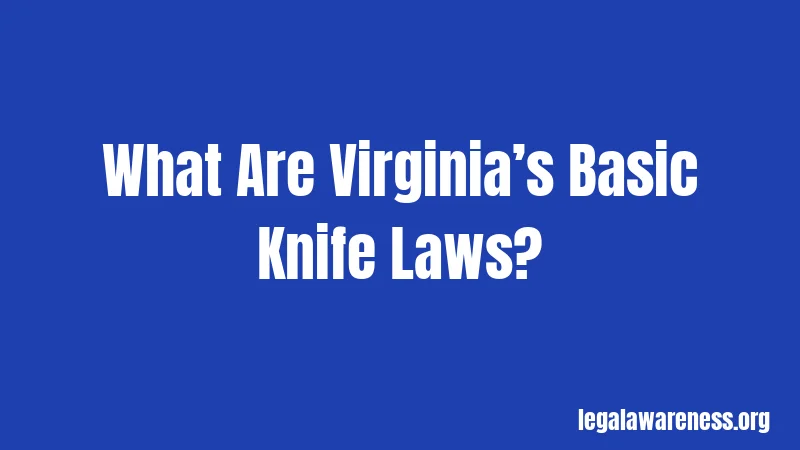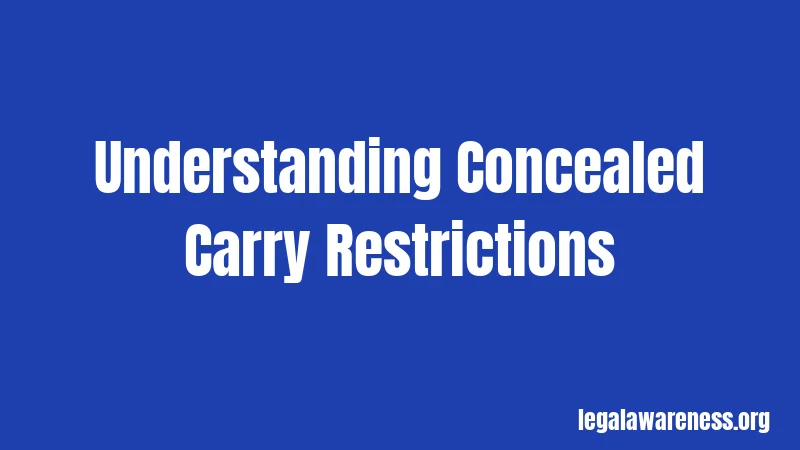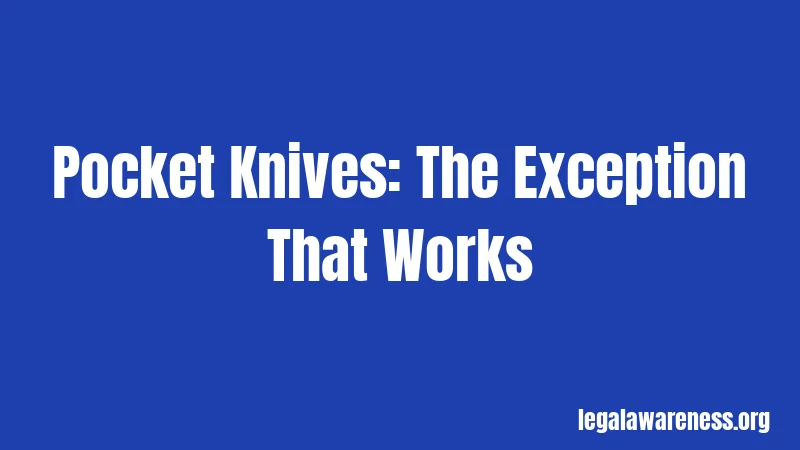Virginia Knife Laws in 2026: The Complete Carry Guide
Most people have no idea how many knife rules exist in Virginia. Seriously. But here’s the thing—Virginia’s knife laws are pretty reasonable compared to other states. The state actually gives you a lot of freedom with what you can own and carry.
That said, there are some important traps to avoid. Get the rules wrong, and you could face jail time or a hefty fine. The good news? We’ll break down exactly what you need to know so you can carry your knife legally and without worry.
What Are Virginia’s Basic Knife Laws?

Virginia takes a pretty balanced approach to knives. The state lets you own almost any type of knife you want. No restrictions on ownership itself. Right?
But here’s where it gets tricky. Virginia DOES restrict how you carry certain knives. And it DOES ban knives in specific places. Let’s talk about each one.
Knives You Can Legally Own and Carry
Okay, so the good news. You can own pretty much any knife in Virginia. This includes pocket knives, utility knives, hunting knives, dirks, Bowie knives, and even fixed-blade knives. Most of these are totally legal to own.
The state doesn’t care if your knife is folding or fixed. It doesn’t care about the blade material. And honestly, it doesn’t care about the length for ownership purposes.
What about open carry? Trust me, this one’s important. Virginia allows open carry of almost any legal knife without blade length restrictions. You can walk around with a hunting knife visible on your belt. You can have a large fixed-blade knife in plain sight. Nobody’s going to arrest you for that.
Understanding Concealed Carry Restrictions

Hold on, this part gets serious. Concealed carry is where Virginia draws the line. And the rules are really specific.
Here’s what you CANNOT carry concealed in Virginia:
- Dirks (described as long, straight-bladed daggers)
- Bowie knives (large hunting knives, typically 10 to 15 inches)
- Stilettos (slim, pointed daggers)
- Ballistic knives (knives with spring-loaded ejecting blades)
- Machetes (large chopping blades)
- Razors
Carrying any of these hidden from view is a Class 1 Misdemeanor. That means up to one year in jail and a fine up to $2,500.
Not sure what counts as concealed? Let me break it down. If a knife is hidden from common observation, it’s concealed. This includes:
- Knives in backpacks or handbags
- Knives in jacket pockets covered by clothing
- Knives in vehicle glove compartments
- Basically anything that’s not immediately visible
Recent Changes: The Switchblade Story
Wait, it gets better. Virginia changed its switchblade laws recently, and this one’s important to know.
For many years, switchblades were basically banned in Virginia. You couldn’t own them. You couldn’t carry them. That’s changed.
Effective July 1, 2022, Virginia repealed the ban on owning switchblades. Then on July 1, 2023, the state removed switchblades from the concealed weapons list. This means you can now legally carry a switchblade in Virginia—even concealed. Yep, that’s all you need to do.
This was a big win for knife owners. But remember, local laws might still be stricter. Always check your specific city or county rules.
Pocket Knives: The Exception That Works

Here’s the thing about pocket knives in Virginia—they get special treatment. And it’s pretty generous.
You can carry a pocket knife openly or concealed without any problem. Just one catch: the blade must be less than three inches long. That’s it. A folding blade under three inches? You’re totally fine.
Most everyday pocket knives fall into this category. You won’t have any trouble with a standard knife from a hardware store or outdoor gear shop.
Where You CANNOT Carry Any Large Knife
Now let’s talk about location restrictions. These are hard rules, and they apply everywhere in Virginia.
Schools and School Property
Only pocket knives with blades under three inches are allowed here. All other knives are prohibited. This includes knives on school buses and school grounds during any school function. Teachers can’t carry them. Parents picking up kids can’t carry them. Students definitely can’t carry them.
The only exception? Knives used as part of school curriculum, meals services, or authorized school programs.
Courthouses
Virginia bans carrying dirks and Bowie knives into courthouses. This is statewide and strict. Law enforcement officers on duty are exempt. But regular citizens? No large knives in the courthouse.
Airports
Airports have strict federal rules, plus Virginia adds its own. You cannot carry certain knives in secure areas of airports. Only pocket knives under three inches. If you’re flying, leave your larger knives at home or in checked baggage.
Places of Worship
Here’s one people often miss. You cannot carry a Bowie knife or dagger into a place of worship while a meeting is happening without “good and sufficient reason.” This is specific to religious gatherings.
Ballistic Knives: Basically Banned
Okay, so this one’s straightforward. Ballistic knives are knives with a blade that ejects from the handle using a spring mechanism or explosive charge. These are practically banned in Virginia.
You cannot legally own one. You cannot legally carry one. You cannot sell one. It’s not worth the risk. The penalty is a Class 4 Misdemeanor with fines up to $250.
Why are they banned? The state considers them too dangerous. And honestly, it’s hard to argue.
What Are the Actual Penalties?
Wondering if this applies to you? Here’s what happens if you break Virginia knife laws.
Class 1 Misdemeanor (most common knife violations):
- Up to one year in jail
- Fine up to $2,500
- Or both jail time AND the fine
This applies to carrying dirks, Bowie knives, or other restricted knives concealed. It also applies to carrying prohibited knives in schools, courthouses, or other restricted locations.
Class 4 Misdemeanor (selling ballistic knives):
- Fine up to $250 only
- No jail time typically attached
Sound complicated? It’s actually pretty straightforward. If you carry the wrong knife the wrong way, it’s serious.
Special Circumstances and Exceptions
Most people assume these rules apply to everyone equally. They’re actually not that rigid. Several exceptions exist under Virginia law.
Law Enforcement
Police officers on duty can carry almost any knife. Concealed, open, large blade—whatever. They’re exempt from most restrictions. Off-duty officers? That gets murkier. It’s best to check with your local department.
Military Personnel
Active-duty military gets exemptions similar to law enforcement. When you’re performing official military duties, Virginia’s restrictions don’t apply.
Collectors and Weapon Shows
Here’s one that surprises people. If you’re a member of a legitimate weapons collecting organization and traveling to a weapons exhibition, you can transport restricted knives. They must be unloaded (if applicable) and securely wrapped. This is for legitimate collectors, not just anyone.
People in Trades
If you use a knife as part of your job—like a chef, carpenter, or hunter—you get special consideration. You can carry your work knives in school buildings and other locations if you’re actually using them for work. The moment you leave work? The general rules apply.
Giving Knives to Minors: Don’t Do This
This is one rule that has zero wiggle room. Furnishing certain knives to minors is a Class 1 Misdemeanor.
You cannot give a minor (anyone under 18) any switchblade, dirk, or Bowie knife. You cannot sell one to them either. This applies to parents, guardians, and anyone else.
Is it strict? Yes. But Virginia’s reasoning is simple: youth and large blades don’t mix safely.
Brandishing a Knife: Criminal Behavior
Let’s talk about using a knife to threaten someone. This is where knife laws become serious.
Virginia law makes it illegal to brandish a machete or any blade 12 inches or longer with the intent to intimidate someone. This is a Class 1 Misdemeanor. You could face jail time.
Even if you don’t intend to hurt anyone, threatening someone with a knife is a crime. Self-defense? That’s different. The law specifically allows “excusable or justifiable self-defense.”
But if you point a knife at someone to scare them? That’s illegal. Don’t do it.
Local Ordinances Matter More Than You Think
Here’s where things get important. Virginia doesn’t have statewide knife preemption in most areas. That means your city or county might have stricter rules than the state.
For example, Richmond might ban carrying large knives in public. Alexandria might have its own rules. Your small hometown? Might be completely different.
Here’s what you should do: Check your local ordinances before carrying any large knife. Call your county or city government. Ask if they have knife restrictions. Honestly, most people don’t realize local laws can be stricter than state law.
The ONLY place where Virginia enforces statewide rules? Airports. The state uniform regulations override any local ordinance at airports.
How to Stay Legal: Practical Steps
Okay, so now you know the rules. What should you actually do to stay safe and legal?
Step 1: Know Your Knife
Be able to describe your knife accurately. Is it a dirk? A Bowie knife? A pocket knife? The difference matters legally. If you’re unsure, ask a knife expert or do your research.
Step 2: Check Your Location’s Rules
Before carrying any large knife, confirm your city and county laws. One phone call to your local police department can save you a lot of trouble.
Step 3: Choose Open Carry When Possible
Here’s the honest truth. Open carry is way safer legally than concealed carry. If you can carry your knife visibly, do it. You’ll avoid the biggest legal trap.
Step 4: Keep Pocket Knives Simple
If you carry a pocket knife under three inches, you’re basically fine everywhere. It’s the safest legal option.
Step 5: Never Carry in Restricted Locations
Don’t bring large knives to schools, courthouses, or airports. It’s not worth the risk.
What Counts as a “Large” Knife?
This question confuses a lot of people. Virginia doesn’t always define exact measurements. But here’s what legal experts agree on:
Pocket knives: Under three inches (clearly defined in law).
Dirks: Long straight-bladed daggers. Usually considered anything that looks like a dagger or sword.
Bowie knives: Large hunting knives, typically 10 to 15 inches. If it looks like a serious hunting or fighting knife, it probably counts.
Stilettos: Slim pointed daggers designed for stabbing.
Machetes: Large chopping blades, usually over 12 inches.
When in doubt, assume it’s restricted if it looks aggressive or is longer than a standard pocket knife.
Traveling with Knives in Virginia
Planning to bring knives into Virginia from another state? Or taking Virginia knives somewhere else? Here’s what matters.
Virginia respects knives you legally own elsewhere. But once you cross into Virginia, Virginia law applies. Switchblades that are legal in another state? Legal in Virginia too (thanks to the 2023 law change). But dirks? Still restricted here.
If you’re traveling with knives, keep them in your vehicle when you can. Don’t carry them on your person in sensitive locations. And definitely research your destination’s laws before traveling.
Frequently Asked Questions
Can I legally own a switchblade in Virginia? Yes! As of July 1, 2022, switchblades are completely legal to own. You can even carry them concealed as of July 1, 2023. This was a major change that surprised a lot of people.
What’s the longest pocket knife blade I can carry? The legal limit is less than three inches. Anything three inches or longer needs to be considered a larger knife with concealed carry restrictions. Stick under three inches and you’re safe almost everywhere.
Can I carry a Bowie knife openly? Yes, you can carry a Bowie knife openly without restriction on blade length. But you absolutely cannot carry it concealed. If it’s hidden from view, it’s illegal. And schools, courthouses, and airports still ban them entirely.
Are hunting knives legal in Virginia? Most hunting knives are legal to own. You can carry them openly. But check local ordinances before carrying them in populated areas. Some cities might have additional restrictions.
What happens if I carry a concealed dirk? You could be charged with a Class 1 Misdemeanor. This means up to one year in jail and a fine up to $2,500. It’s not a small violation. The state takes this seriously.
Do I need a permit to carry knives in Virginia? No knife permit exists in Virginia. You just follow the concealed carry restrictions. If your knife is legal to conceal carry, you’re fine. If it’s not, you need to carry it openly.
What should I do if I’m unsure about my knife? Call your local law enforcement non-emergency line. Ask them directly. They can tell you if your specific knife is legal to carry in your area. This is always the safest approach.
Final Thoughts
Virginia’s knife laws are actually pretty fair compared to other states. You get a lot of freedom with what you can own and openly carry. The main restrictions focus on concealed carry and sensitive locations.
Here’s the bottom line: Keep pocket knives under three inches and you’re golden almost everywhere. Carry larger knives openly and check your local laws. Never bring them to schools, courthouses, or airports. And definitely don’t threaten people with them.
The rules exist to keep people safe while respecting knife owners’ rights. Understanding them means you can carry your knife legally and confidently. When in doubt, ask your local law enforcement. They’re usually happy to help.
Stay informed, stay safe, and enjoy responsibly carrying your knives in Virginia.
References
- Virginia State Police Firearms and Concealed Weapons FAQ
- Virginia Code § 18.2-308: Carrying Concealed Weapons
- Virginia Code § 18.2-308.1: Possession of Weapons on School Property
- Virginia Code § 18.2-311: Prohibited Weapons
- American Knife and Tool Institute – Virginia Knife Laws
- Knife Rights Legislative Update – Virginia 2023
